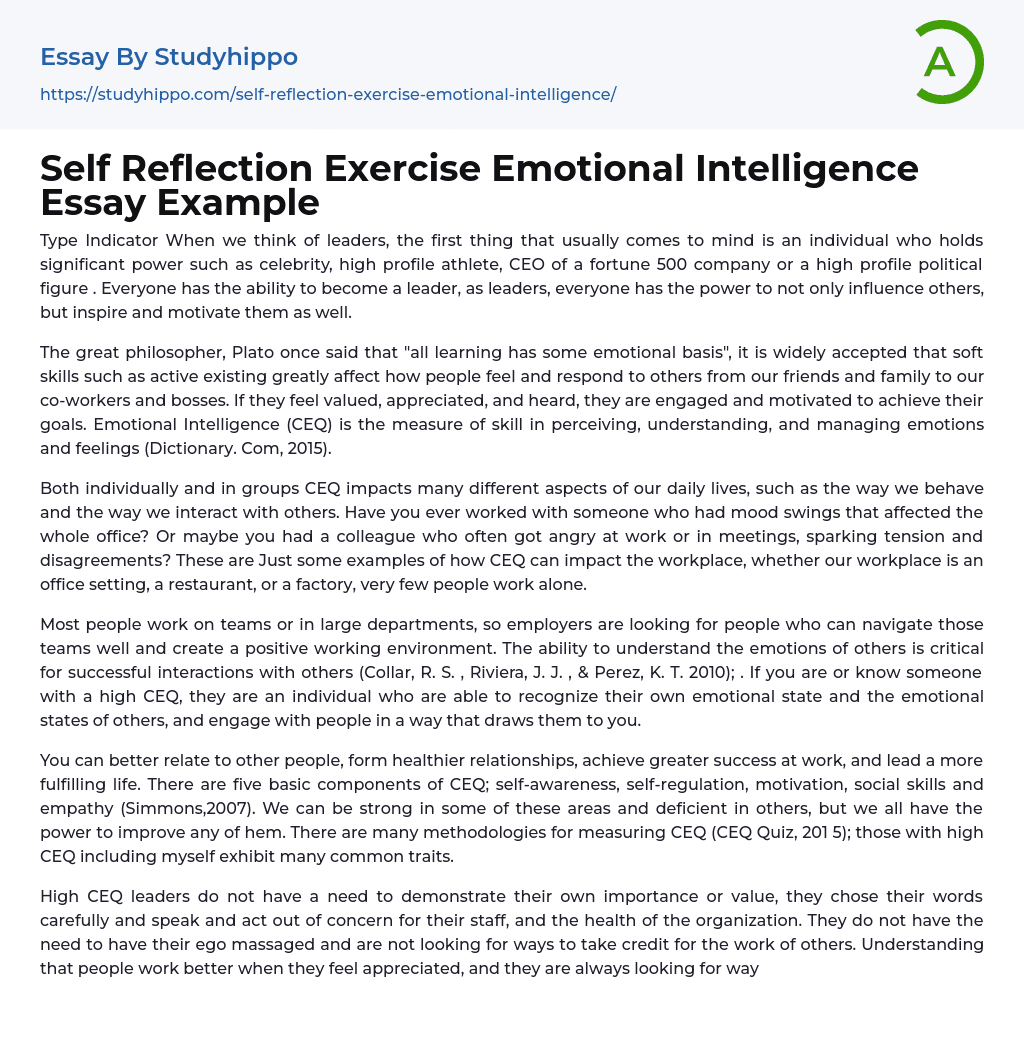

Self Reflection Exercise Emotional Intelligence Essay Example
Type Indicator When we think of leaders, the first thing that usually comes to mind is an individual who holds significant power such as celebrity, high profile athlete, CEO of a fortune 500 company or a high profile political figure . Everyone has the ability to become a leader, as leaders, everyone has the power to not only influence others, but inspire and motivate them as well.
The great philosopher, Plato once said that "all learning has some emotional basis", it is widely accepted that soft skills such as active existing greatly affect how people feel and respond to others from our friends and family to our co-workers and bosses. If they feel valued, appreciated, and heard, they are engaged and motivated to achieve their goals. Emotional Intelligence (CEQ) is the measure of skill in perceiving, understan
...ding, and managing emotions and feelings (Dictionary. Com, 2015).
Both individually and in groups CEQ impacts many different aspects of our daily lives, such as the way we behave and the way we interact with others. Have you ever worked with someone who had mood swings that affected the whole office? Or maybe you had a colleague who often got angry at work or in meetings, sparking tension and disagreements? These are Just some examples of how CEQ can impact the workplace, whether our workplace is an office setting, a restaurant, or a factory, very few people work alone.
Most people work on teams or in large departments, so employers are looking for people who can navigate those teams well and create a positive working environment. The ability to understand the emotions of others is critical for successful
interactions with others (Collar, R. S. , Riviera, J. J. , & Perez, K. T. 2010); . If you are or know someone with a high CEQ, they are an individual who are able to recognize their own emotional state and the emotional states of others, and engage with people in a way that draws them to you.
You can better relate to other people, form healthier relationships, achieve greater success at work, and lead a more fulfilling life. There are five basic components of CEQ; self-awareness, self-regulation, motivation, social skills and empathy (Simmons,2007). We can be strong in some of these areas and deficient in others, but we all have the power to improve any of hem. There are many methodologies for measuring CEQ (CEQ Quiz, 201 5); those with high CEQ including myself exhibit many common traits.
High CEQ leaders do not have a need to demonstrate their own importance or value, they chose their words carefully and speak and act out of concern for their staff, and the health of the organization. They do not have the need to have their ego massaged and are not looking for ways to take credit for the work of others. Understanding that people work better when they feel appreciated, and they are always looking for ways to give positive feedback and awards for a Job well done (staff announcements, hand written thank you notes or a staff luncheon are Just some common examples) .
Also, leaders who have good social skills are good at managing change and resolving conflicts diplomatically. They are rarely satisfied with leaving things until the last minute, they do not sit
back and make everyone else do the work; they set an example with their own behavior. Furthermore, good leaders make themselves available to those reporting to them both physically and emotionally. They are responsive to the fact that there will be mimes that those reporting to them will be having difficulties outside of work that will impact them.
Death of family members, friends, relationship breakdowns, and all sorts of crises will affect virtually everyone at work at times. Emotionally open and secure leaders understand that and are there for support during these difficult times. Moreover, high CEQ leaders are aware of their strong emotions and avoid speaking out of anger and frustration. If they feel the urge to give in to strong emotions in their interactions with others, they give themselves a time out, waiting until their emotions eve leveled off and they have had a chance to think about the situation (Kumar, 2012).
Also, leaders with empathy have the ability to put themselves in someone else's situation. They help develop the people on their team, challenge others who are acting unfairly, give constructive feedback, and listen to those who need it. CEQ leaders earn the respect and loyalty of their team and the people around you, by showing them that they care by being empathic. To conclude, emotional intelligence is one the single best predictors of performance in the workplace and the strongest driver of leadership and personal excellence.
- Being A Leader essays
- Servant Leadership essays
- Leadership Experience essays
- Leadership Qualities essays
- Ambition essays
- Anger essays
- Betrayal essays
- Boredom essays
- Confidence essays
- Courage essays
- Desire essays
- Disgrace essays
- Doubt essays
- Empathy essays
- Fairness essays
- Fear essays
- Feeling essays
- Forgiveness essays
- Grief essays
- Guilt essays
- Happiness essays
- Harmony essays
- Hate essays
- Honesty essays
- Honor essays
- Hope essays
- Humanity essays
- Inspiration essays
- Kindness essays
- Laughter essays
- Loneliness essays
- Lost essays
- Loyalty essays
- Need essays
- Passion essays
- Pressure essays
- Pride essays
- Regret essays
- Respect essays
- Responsibility essays
- Sarcasm essays
- Shame essays
- Suffering essays
- Suspense essays
- Tolerance essays
- Board Of Directors essays
- Brand Management essays
- Business Ethics essays
- Business Management essays
- Change Management essays



